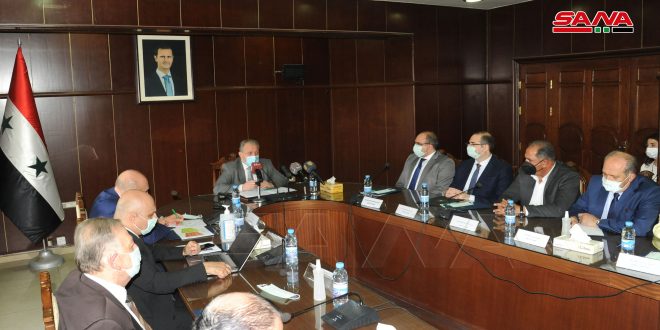Engineer Arnous: Setting priorities precisely to continue production and embodying the slogan “hope for work” on the ground
Damascus (ST): Prime Minister engineer Hussein Arnous, chaired a meeting at the Ministry of Industry that focused on the reality of the industrial public sector and ways to enhance its work, advance it, restore its glow and secure all its requirements to continue producing various basic materials and commodities and secure the local market’s need for them as one of the basic components of the national economy in parallel with the development of its legislative structure to meet the requirements of the current stage and to contribute to confronting the unjust economic blockade imposed on Syria.
Eng. Arnous underlined the importance of precisely setting priorities and embodying the slogan “hope for work” on the ground, making every possible effort to raise production capacity, exploiting human, material and financial resources in all industrial and craft sites, reducing production costs, limiting waste of time, supplies and raw materials, reducing import and creating an intellectual and productive base that would be a starting point for all industrial public sector facilities to be optimally invested and be able to employ modern technology in this sector in a way that guarantees increased efficiency in quantity and quality.
Minister of Industry, Ziyad Sabbagh, gave a presentation on the reality of the Syrian industry in the public and private sectors, the ministry’s economic indicators, the status of employment in it, and the completed and ongoing work, including work to increase the production capacities of cement factories, revive agricultural industrialization and complete projects for the rehabilitation and investment of a number of companies.
Stress was laid on the importance of developing specific plans that can be tracked and measured according to specific time programs in relation to production and marketing ratios, restarting the production wheel, linking incentives to production and investing all industrial establishments in a way that serves the development process and contributes to improving the indicators of the national economy while enhancing partnership with the private sector with regard to establishments totally destroyed by terrorism, provided that the proceeds of any participatory process are to be placed in the rehabilitation and modernization of the industrial public sector facilities.
They pointed to the great opportunities provided by the new investment law for the private sector to start work and the necessity of setting the industrial investment map to come up with a time-bound program for the number and types of establishments to be implemented and the importance of raising the contribution of the industrial public sector to the state’s public revenues.
K.Q.

